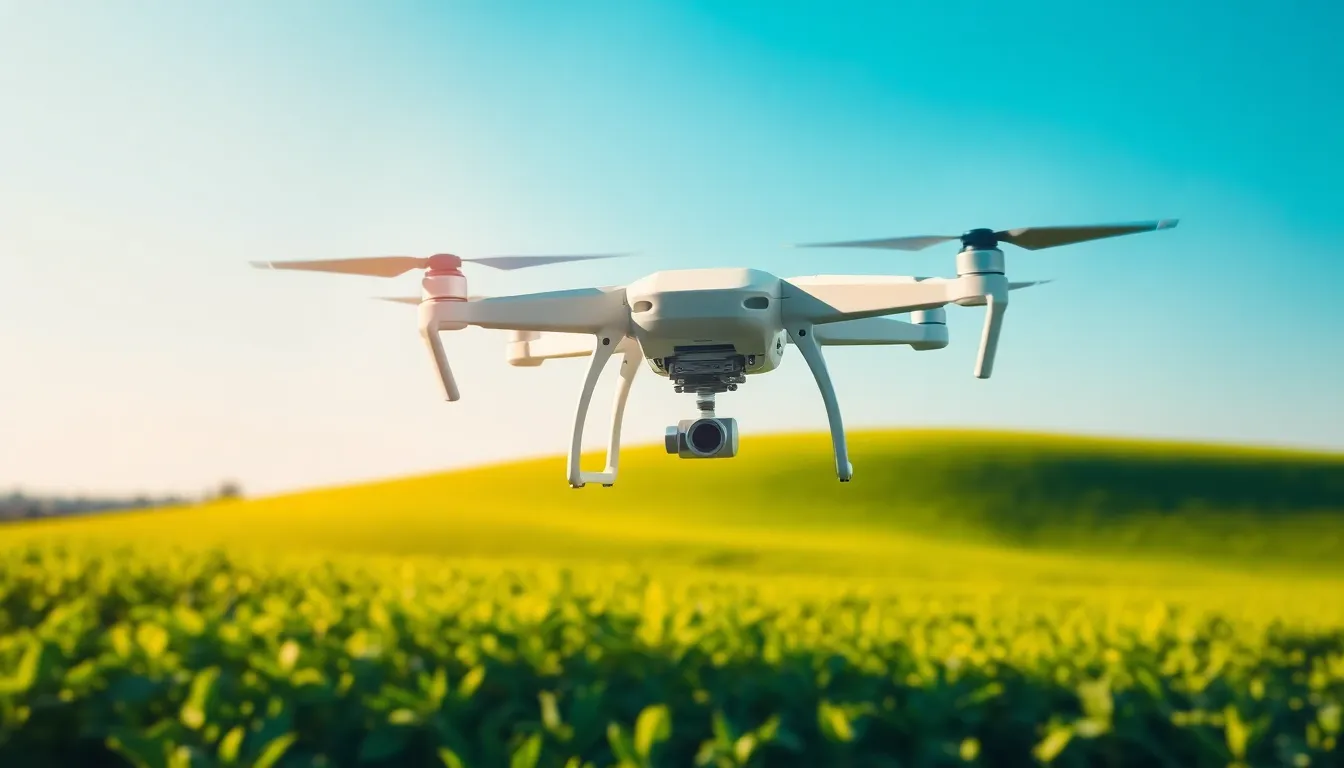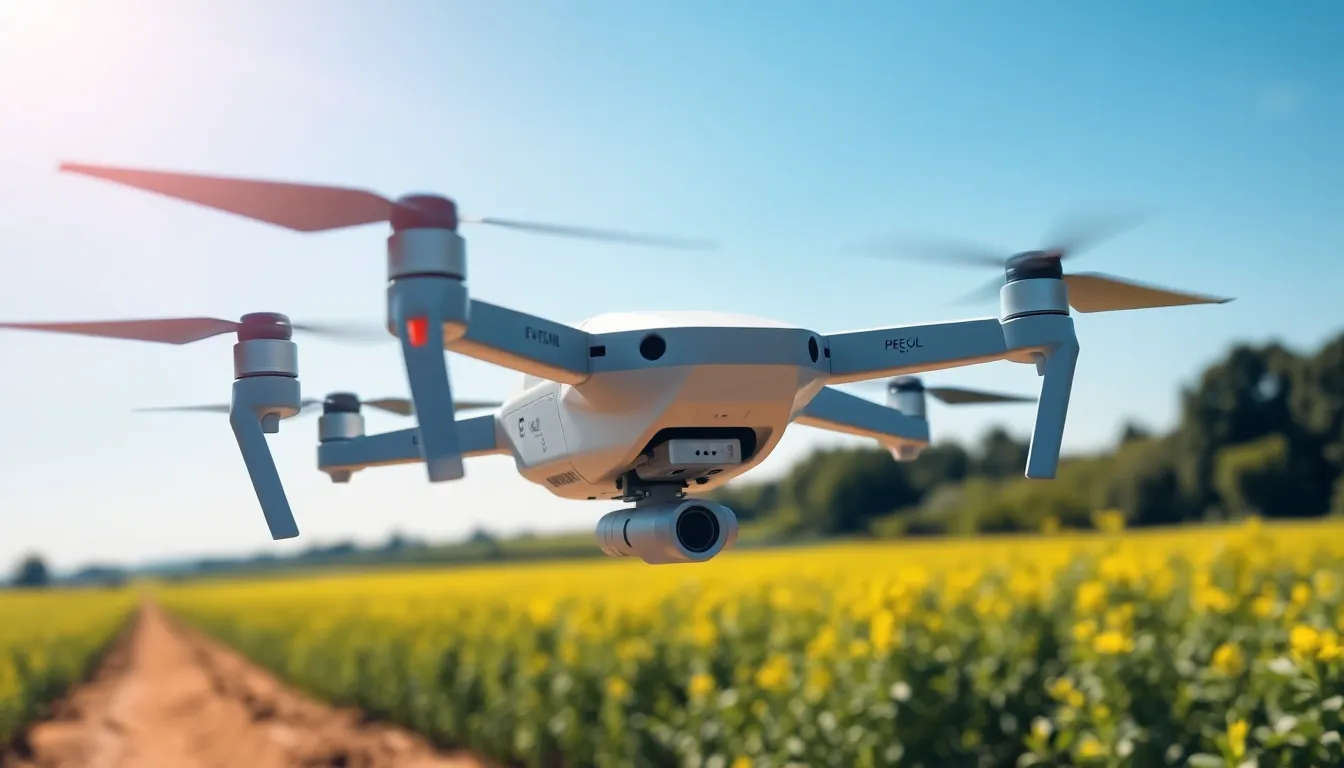In a world where drones are no longer just for delivering pizza or capturing epic selfies, investing in drone company stocks has become a hot topic. These flying marvels are revolutionizing industries from agriculture to logistics, making them a goldmine for savvy investors. If you’re not paying attention, you might miss the next big thing soaring right past you.
Drone Company Stocks
Investors observe the increasing valuation and interest in drone company stocks. As drone technology evolves, companies engaged in this sector expand their service offerings, appealing to a broader market. Notably, stocks of major players like DJI, Boeing, and Alphabet reflect this growth, signaling promising returns for shareholders.
Data indicates that the global drone market is expected to exceed $43 billion by 2024. Market participants often consider factors such as technological advancements and regulatory environments when evaluating investment potential. Specifically, increased use in agriculture and logistics drives demand, pushing share prices higher. Companies leveraging artificial intelligence in drones attract investor attention due to enhanced capabilities and efficiencies.
Industry analysts frequently highlight stocks of smaller, innovative companies as potential high-reward investments. Startups specializing in delivery drones or surveillance technologies often showcase significant year-over-year growth. Reports reveal that some emerging firms have seen stock prices double after successful funding rounds.
Dividend yields from established drone manufacturers present an attractive option for income-focused investors. Noteworthy companies returning dividends incorporate drone technology into their business models, creating a stable revenue stream. Additionally, interest from government contracts further fuels growth prospects, leading to higher stock valuations.
Overall, drone company stocks represent a dynamic investment opportunity backed by technological advancement and robust market growth. Investors savvy in this field benefit significantly by paying attention to trends and innovations in drone technology.
Key Players in the Drone Industry

The drone industry features a mix of established manufacturers and emerging startups that contribute significantly to its growth. Investors looking to engage with drone company stocks should explore these key players for potential opportunities.
Major Drone Manufacturers
Dominating the industry, companies like DJI and Boeing lead in drone manufacturing. DJI holds a substantial share of the consumer drone market, known for both innovation and reliable products. Boeing specializes in military drones, serving defense and government sectors. Alphabet focuses on delivery systems through its Wing subsidiary, pushing drone technology into logistics. These manufacturers offer diverse investment prospects, emphasizing technological advancement and market reach.
Emerging Startups
Innovative startups present compelling opportunities within the drone sector. Companies like Zipline focus on medical supply delivery, showcasing drones’ potential in healthcare. Skydio emphasizes advanced autonomous flying capabilities, attracting significant attention from investors. Additionally, companies engaging in surveillance and agriculture drones are on the rise, offering unique technology solutions. Multiple startups are positioned for high-growth potential, allowing investors to diversify their portfolios within this dynamic environment.
Market Trends Influencing Drone Company Stocks
Market trends in drone technology are rapidly evolving, significantly impacting company stocks. Investors should pay attention to these key factors.
Technological Innovations
Innovative advancements in drone technologies drive stock movements. Autonomous flight systems enhance operational efficiency and expand application areas. Precision agriculture drones, for example, improve crop monitoring and yield optimization. Companies developing specialized hardware and software attract considerable interest from investors. Enhanced imaging and sensing technologies also increase demand across industries like logistics and healthcare. Stock valuations reflect the potential growth in these sectors as businesses adopt drone solutions.
Regulatory Developments
Regulatory frameworks shape the landscape for drone company stocks. Governments are increasingly recognizing the need for structured regulations to ensure safety and integration into airspace. The Federal Aviation Administration (FAA) in the United States has made strides in tasking rules for commercial drone operations. Clear guidelines provide stability and predictability for investors by encouraging market participation. Furthermore, global regulatory harmonization fosters international growth opportunities, particularly in regions pursuing advanced drone applications. Regulatory clarity boosts investor confidence and influences stock performance in this dynamic market.
Investment Opportunities in Drone Company Stocks
Investors face exciting choices in the rapidly evolving drone industry. Whether focusing on public or private companies, opportunities abound.
Public vs. Private Companies
Public companies offer accessibility through stock exchanges, allowing investors to trade shares easily. Notable public firms like DJI and Boeing attract attention for their established market positions. Investing in publicly traded entities provides liquidity and transparency through regular reporting. Alternatively, private companies, such as Zipline and Skydio, present unique opportunities for significant capital growth. These startups operate on innovative fronts, targeting niche markets. While the potential returns are enticing, investing in private companies often requires patience due to limited data on performance. Both paths can diversify portfolios, so investors should weigh their options carefully based on risk tolerance and market knowledge.
Risks and Challenges
Investing in drone company stocks presents inherent risks. Regulatory changes, particularly in aviation laws, can impact operational capabilities. Companies also face technological hurdles, with rapid advancements necessitating continuous innovation. Market competition is fierce, as established firms and startups strive to capture market share. Volatile market conditions can lead to unpredictable stock performance. Moreover, economic downturns may affect funding availability for cutting-edge projects. Investors should assess each company’s strategy and adaptability to navigate these challenges effectively. Staying informed about industry trends and potential disruptions helps minimize risks associated with investments in the drone sector.
Future Outlook for Drone Company Stocks
Drones are set to transform numerous sectors, creating substantial investment potential. The global drone market is projected to exceed $43 billion by 2024, driving interest among investors in drone company stocks. Technological advancements will boost efficiency in industries like agriculture and logistics, ensuring continuous demand for innovative drones.
Investors should keep an eye on major players such as DJI, Boeing, and Alphabet. These companies have established strong foundations and consistently deliver promising returns. Emerging startups, including Zipline and Skydio, attract attention due to their unique approaches in healthcare delivery and autonomous flying, offering high-reward opportunities.
Regulatory developments also play a critical role in shaping the future of drone stock performance. The FAA’s frameworks provide stability, fostering market participation and enhancing investor confidence. Over time, as regulations evolve, the growth prospects for drone company stocks will improve, reflecting the industry’s maturation.
Market trends indicate a shift towards advanced imaging and sensing technologies, increasing demand across various sectors. Investors focused on these areas are likely to experience significant returns, driven by innovation and market growth.
Careful assessment of each company’s strategy and adaptability is essential in navigating potential risks. Regulatory changes and technological challenges could affect performance, making it vital to stay updated on industry trends. As the drone landscape continues to develop, remaining informed positions investors to capitalize on opportunities within this dynamic sector.
Conclusion
The future of drone company stocks holds immense promise as technological advancements and regulatory clarity drive growth. Investors who recognize the potential of this sector can position themselves for significant returns. With established players and innovative startups leading the charge, there’s a wealth of opportunities to explore.
Staying informed about market trends and company strategies will be crucial for navigating the inherent risks. Those who actively engage with this evolving landscape are likely to benefit from the transformative impact of drones across various industries. As the market continues to expand, the potential for lucrative investments remains strong.

